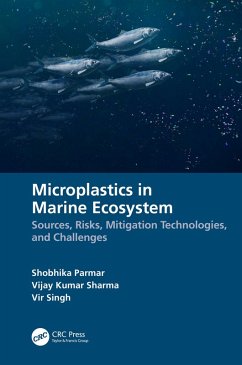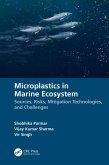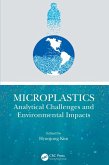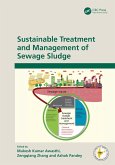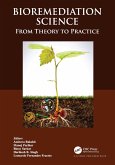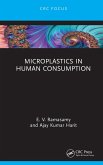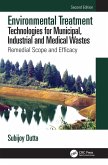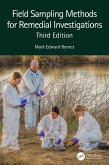Shobhika Parmar, Vijay Kumar Sharma, Vir Singh
Microplastics in Marine Ecosystem (eBook, PDF)
Sources, Risks, Mitigation Technologies, and Challenges
49,95 €
49,95 €
inkl. MwSt.
Sofort per Download lieferbar

25 °P sammeln
49,95 €
Als Download kaufen

49,95 €
inkl. MwSt.
Sofort per Download lieferbar

25 °P sammeln
Jetzt verschenken
Alle Infos zum eBook verschenken
49,95 €
inkl. MwSt.
Sofort per Download lieferbar
Alle Infos zum eBook verschenken

25 °P sammeln
Shobhika Parmar, Vijay Kumar Sharma, Vir Singh
Microplastics in Marine Ecosystem (eBook, PDF)
Sources, Risks, Mitigation Technologies, and Challenges
- Format: PDF
- Merkliste
- Auf die Merkliste
- Bewerten Bewerten
- Teilen
- Produkt teilen
- Produkterinnerung
- Produkterinnerung

Bitte loggen Sie sich zunächst in Ihr Kundenkonto ein oder registrieren Sie sich bei
bücher.de, um das eBook-Abo tolino select nutzen zu können.
Hier können Sie sich einloggen
Hier können Sie sich einloggen
Sie sind bereits eingeloggt. Klicken Sie auf 2. tolino select Abo, um fortzufahren.

Bitte loggen Sie sich zunächst in Ihr Kundenkonto ein oder registrieren Sie sich bei bücher.de, um das eBook-Abo tolino select nutzen zu können.
It covers major issues relating to microplastic pollution including its sources and sink of the microplastics and their environmental fate. It focusses on the impacts of microplastic pollution on the marine life and human health including available conventional methods, future solution for the prevention and control of the related pollution.
- Geräte: PC
- mit Kopierschutz
- eBook Hilfe
Andere Kunden interessierten sich auch für
![Microplastics in Marine Ecosystem (eBook, ePUB) Microplastics in Marine Ecosystem (eBook, ePUB)]() Shobhika ParmarMicroplastics in Marine Ecosystem (eBook, ePUB)49,95 €
Shobhika ParmarMicroplastics in Marine Ecosystem (eBook, ePUB)49,95 €![Microplastics (eBook, PDF) Microplastics (eBook, PDF)]() Microplastics (eBook, PDF)49,95 €
Microplastics (eBook, PDF)49,95 €![Sustainable Treatment and Management of Sewage Sludge (eBook, PDF) Sustainable Treatment and Management of Sewage Sludge (eBook, PDF)]() Sustainable Treatment and Management of Sewage Sludge (eBook, PDF)173,95 €
Sustainable Treatment and Management of Sewage Sludge (eBook, PDF)173,95 €![Bioremediation Science (eBook, PDF) Bioremediation Science (eBook, PDF)]() Bioremediation Science (eBook, PDF)70,95 €
Bioremediation Science (eBook, PDF)70,95 €![Microplastics in Human Consumption (eBook, PDF) Microplastics in Human Consumption (eBook, PDF)]() E. V. RamasamyMicroplastics in Human Consumption (eBook, PDF)20,95 €
E. V. RamasamyMicroplastics in Human Consumption (eBook, PDF)20,95 €![Environmental Treatment Technologies for Municipal, Industrial and Medical Wastes (eBook, PDF) Environmental Treatment Technologies for Municipal, Industrial and Medical Wastes (eBook, PDF)]() Subijoy DuttaEnvironmental Treatment Technologies for Municipal, Industrial and Medical Wastes (eBook, PDF)50,95 €
Subijoy DuttaEnvironmental Treatment Technologies for Municipal, Industrial and Medical Wastes (eBook, PDF)50,95 €![Field Sampling Methods for Remedial Investigations (eBook, PDF) Field Sampling Methods for Remedial Investigations (eBook, PDF)]() Mark Edward ByrnesField Sampling Methods for Remedial Investigations (eBook, PDF)48,95 €
Mark Edward ByrnesField Sampling Methods for Remedial Investigations (eBook, PDF)48,95 €-
-
-
It covers major issues relating to microplastic pollution including its sources and sink of the microplastics and their environmental fate. It focusses on the impacts of microplastic pollution on the marine life and human health including available conventional methods, future solution for the prevention and control of the related pollution.
Dieser Download kann aus rechtlichen Gründen nur mit Rechnungsadresse in A, B, BG, CY, CZ, D, DK, EW, E, FIN, F, GR, HR, H, IRL, I, LT, L, LR, M, NL, PL, P, R, S, SLO, SK ausgeliefert werden.
Produktdetails
- Produktdetails
- Verlag: Taylor & Francis eBooks
- Seitenzahl: 228
- Erscheinungstermin: 11. Mai 2023
- Englisch
- ISBN-13: 9781000878011
- Artikelnr.: 67654328
- Verlag: Taylor & Francis eBooks
- Seitenzahl: 228
- Erscheinungstermin: 11. Mai 2023
- Englisch
- ISBN-13: 9781000878011
- Artikelnr.: 67654328
- Herstellerkennzeichnung Die Herstellerinformationen sind derzeit nicht verfügbar.
Shobhika Parmar is Ph.D. in Environment Science from G. B. Pant University of Agriculture & Technology, Pantnagar, India. She recently served as a Postdoctoral Researcher in Kunming University of Science and Technology, Kunming, China. She also received the Yunnan Provincial Government Funding in China (2019). She has more than eleven years of research experience, focused on environmental issues and problems, remediation strategies. She has about 25 publications in journals of international repute and book chapters in edited books.
Vijay Kumar Sharma received his Ph.D. degree from Banaras Hindu University, Varanasi, India and completed two years of Post-Doctoral Research in Kunming University of Science and Technology, Kunming, China. Currently, he is serving as a visiting scientist at Agricultural Research Organization - Volcani Centre, Israel. He has more than fourteen years of research experience. His research interest is in the bio-potential applications of endophytes and their mechanism. He also has a keen interest in emerging environmental issues and mitigation, and works on few collaborative projects on the same area. Dr. Sharma has published more than 50 research articles and book chapters in journals of international, and edited four books. He is also active as a reviewer and guest editor of some reputed journals. He has also actively participated in many national and international conferences, symposia and workshops related to his research field in India, China and Cyprus.
Vir Singh is currently serving as an Emeritus Professor in the Department of Environmental Science, College of Basic Sciences and Humanities, GB Pant University of Agriculture and Technology, India. He has more than three decades experience in teaching, research, extension, project execution, and research supervision. He has been educated and trained in many universities and institutes in India and has also worked with many reputed organizations outside India, including International Centre for Integrated Mountain Development (ICIMOD) based in Kathmandu, Nepal, Galilee International Management Institute (GIMI) in Israel, and Friedrich-Schiller University in Germany. Prof. Vir Singh has published 55 books, many monographs, lab manuals, and more than 250 research papers, book chapters, and popular articles. His textbook on Environmental Plant Physiology (Taylor and Francis, CRC Press, 2020) brings to the fore a botanical strategy for a climate-smart planet. He is also a Climate Reality Leader committed to creating awareness about the ongoing climate change and its long-term implications on every walk of life. He is also actively engaged in environmental writing. His articles on vital contemporary issues are being widely published in English and Hindi dailies and e-magazines.
Vijay Kumar Sharma received his Ph.D. degree from Banaras Hindu University, Varanasi, India and completed two years of Post-Doctoral Research in Kunming University of Science and Technology, Kunming, China. Currently, he is serving as a visiting scientist at Agricultural Research Organization - Volcani Centre, Israel. He has more than fourteen years of research experience. His research interest is in the bio-potential applications of endophytes and their mechanism. He also has a keen interest in emerging environmental issues and mitigation, and works on few collaborative projects on the same area. Dr. Sharma has published more than 50 research articles and book chapters in journals of international, and edited four books. He is also active as a reviewer and guest editor of some reputed journals. He has also actively participated in many national and international conferences, symposia and workshops related to his research field in India, China and Cyprus.
Vir Singh is currently serving as an Emeritus Professor in the Department of Environmental Science, College of Basic Sciences and Humanities, GB Pant University of Agriculture and Technology, India. He has more than three decades experience in teaching, research, extension, project execution, and research supervision. He has been educated and trained in many universities and institutes in India and has also worked with many reputed organizations outside India, including International Centre for Integrated Mountain Development (ICIMOD) based in Kathmandu, Nepal, Galilee International Management Institute (GIMI) in Israel, and Friedrich-Schiller University in Germany. Prof. Vir Singh has published 55 books, many monographs, lab manuals, and more than 250 research papers, book chapters, and popular articles. His textbook on Environmental Plant Physiology (Taylor and Francis, CRC Press, 2020) brings to the fore a botanical strategy for a climate-smart planet. He is also a Climate Reality Leader committed to creating awareness about the ongoing climate change and its long-term implications on every walk of life. He is also actively engaged in environmental writing. His articles on vital contemporary issues are being widely published in English and Hindi dailies and e-magazines.
Chapter 1. Sources and Sink of Microplastics. Chapter 2. Analytical Methods
for the Identification and Assessment of Microplastics. Chapter 3.
Ecological Risks and Environmental Fate of Microplastic Pollution. Chapter
4. Human Health impacts of Microplastics Pollution. Chapter 5.
Biodegradation of Microplastics by Microbes. Chapter 6. Potential removal
of the Microplastics in Marine Environment by Membrane Technology:
Limitations and Future Solutions. Chapter 7. Recent Bioengineering advances
in the Plastic Biodegradation and Future Challenges. Chapter 8.
Biopolymers as an Alternative to the Conventional Plastics. Chapter 9.
Global Legislature for the Mitigation of Microplastics in the Marine
Environment. Chapter 10. Role of Community Participation for the Reduction
of Microplastic Emissions. Chapter 11. Recent Cutting-edge Solutions to
Prevent Microplastics Pollution.
for the Identification and Assessment of Microplastics. Chapter 3.
Ecological Risks and Environmental Fate of Microplastic Pollution. Chapter
4. Human Health impacts of Microplastics Pollution. Chapter 5.
Biodegradation of Microplastics by Microbes. Chapter 6. Potential removal
of the Microplastics in Marine Environment by Membrane Technology:
Limitations and Future Solutions. Chapter 7. Recent Bioengineering advances
in the Plastic Biodegradation and Future Challenges. Chapter 8.
Biopolymers as an Alternative to the Conventional Plastics. Chapter 9.
Global Legislature for the Mitigation of Microplastics in the Marine
Environment. Chapter 10. Role of Community Participation for the Reduction
of Microplastic Emissions. Chapter 11. Recent Cutting-edge Solutions to
Prevent Microplastics Pollution.
Chapter 1. Sources and Sink of Microplastics. Chapter 2. Analytical Methods
for the Identification and Assessment of Microplastics. Chapter 3.
Ecological Risks and Environmental Fate of Microplastic Pollution. Chapter
4. Human Health impacts of Microplastics Pollution. Chapter 5.
Biodegradation of Microplastics by Microbes. Chapter 6. Potential removal
of the Microplastics in Marine Environment by Membrane Technology:
Limitations and Future Solutions. Chapter 7. Recent Bioengineering advances
in the Plastic Biodegradation and Future Challenges. Chapter 8.
Biopolymers as an Alternative to the Conventional Plastics. Chapter 9.
Global Legislature for the Mitigation of Microplastics in the Marine
Environment. Chapter 10. Role of Community Participation for the Reduction
of Microplastic Emissions. Chapter 11. Recent Cutting-edge Solutions to
Prevent Microplastics Pollution.
for the Identification and Assessment of Microplastics. Chapter 3.
Ecological Risks and Environmental Fate of Microplastic Pollution. Chapter
4. Human Health impacts of Microplastics Pollution. Chapter 5.
Biodegradation of Microplastics by Microbes. Chapter 6. Potential removal
of the Microplastics in Marine Environment by Membrane Technology:
Limitations and Future Solutions. Chapter 7. Recent Bioengineering advances
in the Plastic Biodegradation and Future Challenges. Chapter 8.
Biopolymers as an Alternative to the Conventional Plastics. Chapter 9.
Global Legislature for the Mitigation of Microplastics in the Marine
Environment. Chapter 10. Role of Community Participation for the Reduction
of Microplastic Emissions. Chapter 11. Recent Cutting-edge Solutions to
Prevent Microplastics Pollution.
